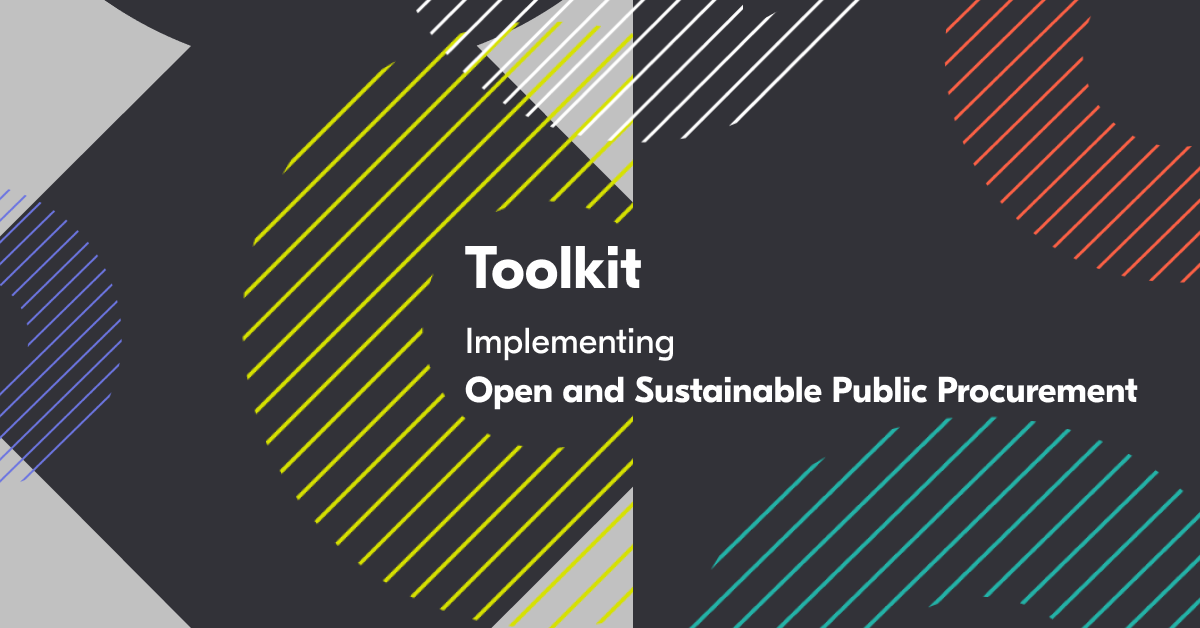Because every procurement should be sustainable.
“The scale and dependability of governments’ collective procurement spending makes it one of the most powerful policy instruments for stimulating innovation to address the climate crisis.”
Tanya Filer, Digital State Policy & Research Lead, Bennett Institute for Public Policy at the University of Cambridge
Our governments will need to buy things in a fundamentally different way if we want to tackle the climate crisis. Sustainability needs to be at the heart of every government purchase if we want to have greener, cleaner, and more resilient supply chains.
Done better and openly, public procurement presents a huge opportunity to fight climate change. Done poorly or left unchanged, procurement will be a brake on environmental and social progress and leave the most vulnerable communities behind.
Here is how open contracting can help to make public procurement more sustainable:
Promoting a net-zero emissions economy through systemic reforms
We are working with partners to put sustainability at the center of their public procurement reforms—helping governments reduce greenhouse gas emissions and track information on green purchasing through better contracting policies, data, and processes.
Our OpenSPP toolkit can help you get started with a sustainable procurement strategy. Our Green Flags guide can help you collect and measure the data you need to track sustainable public procurement implementation and impact.
Stimulating innovation for sustainable public services and infrastructure.
We work with partners to buy better and adopt best practices in sustainable purchasing, embedding innovation and inclusion in high value, high impact projects, such as public works and transportation.
We are working with Mexico City to embed best practices for market and community consultation into their Ecobici green transport scheme. The city will now be able to double the reach of their bikeshare program and upgrade the technology at half the cost.
Building climate-resilient communities.
We support partners to use public engagement, open data, and inclusive procurement processes that center affected communities in the fight against climate change.
We are working with CivicDataLab in India to improve natural disaster preparedness, response, and relief that will better protect vulnerable residents in the flood-prone region of Assam.
Implementing sustainable procurement: stories from the ground
How to get started on sustainable public procurement
There are so many ways to buy more sustainably—from selecting ecolabels, to product lifecycle costing, to measuring carbon emissions, to sourcing more locally. Our new toolkit can help you get started, particularly in low tech environments.
We spoke to 30 procurement practitioners across dozens of countries to identify gaps in sustainable strategies and support, leading to our new Open and Sustainable Public Procurement toolkit. Structured across the whole cycle of planning and delivering public contracts, the toolkit helps you frame a strategy, adopt best practices, and collect the best indicators to measure progress. It is full of practical examples, checklists, and indicators, co-designed with PUBLIC, and Spend Network, and supported by Deutsche Gesellschaft für Internationale Zusammenarbeit (GIZ) GmbH.
Quick ’n’ easy
Our short video provides a quick introduction into the key concepts to implement open sustainable public procurement.
More resources
From policy briefs, guidance on data modeling and a full video introduction, we have more resources to help you implement open and sustainable public procurement.
Our Policy Brief Open, Sustainable Government Procurement. For People, Planet and Prosperity provides a quick overview of the key arguments for open and sustainable public procurement.
This guide provides more detail on what data is needed to calculate SPP indicators and how to disclose that data using the Open Contracting Data Standard (OCDS)
Our work
As we continue to create user-friendly resources and open data tools for practitioners, we are also helping our partners develop new policies from the ground up and implement and track existing policies around sustainable procurement.
Together with the Public Procurement Office in Lithuania, we are showcasing how open data can be used to promote and track sustainable purchasing. Lithuania has created a scoreboard for public authorities, which collects and presents data on technical specifications, award criteria, and clauses, and shows the detailed levels of green procurement uptake across Lithuanian institutions, currently at 53% by value and 30% by total procedures for 2022.
Through our Green Flags work, we are documenting how open data can throw light on sustainable procurement performance and measurement, including for carbon emissions. It is based on research focused on the Netherlands, Lithuania and Paraguay, and on interviews with global practitioners working to define, qualify, operationalize, and measure green public procurement (GPP) in terms of size/scale of purchasing as well as performance.
In Mexico City, where 100 million passengers use public transportation each month, we’re helping expand green transportation solutions to underserved neighborhoods while cutting nearly 6,000 tons of CO2 in the next decade. Through Lift, we supported their cross-departmental team to design a transparent and inclusive process to engage vendors and solicit user feedback. The results are impressive: the service is scheduled to expand from 6,500 to 9,300 bikes and from 480 to 687 bike stations at half the cost.
Through Lift, our impact accelerator program, we are working with the social entrepreneurs at CivicDataLab to address the impact of climate change on disadvantaged communities. Together we are supporting human-centered, resilient infrastructure for flood affected communities in the State of Assam, and this is just one example of how we are working to close the governance gap in sustainable infrastructure.
Taiwan is full of typhoons, and increasingly, heavy torrential rains. In the last decade, there has been an average of eight critical floods per year. A team of computer engineers, data scientists, civil engineering researchers, and journalists worked together to develop data-driven approach to evaluating water resource management building on government procurement data, project information, and geolocational information for floods.
Procurement can’t be sustainable unless it is inclusive. See what we are also doing to improve equity and inclusion, especially for small business, women and marginalized communities in public contracting. Additional Lift projects in El Paso, Texas, Des Moines, Iowa, USA, and Lille, France are focused on embedding social equity and sustainability into each of the city’s procurement operations, including supporting the development and implementation of new green purchasing policies.

